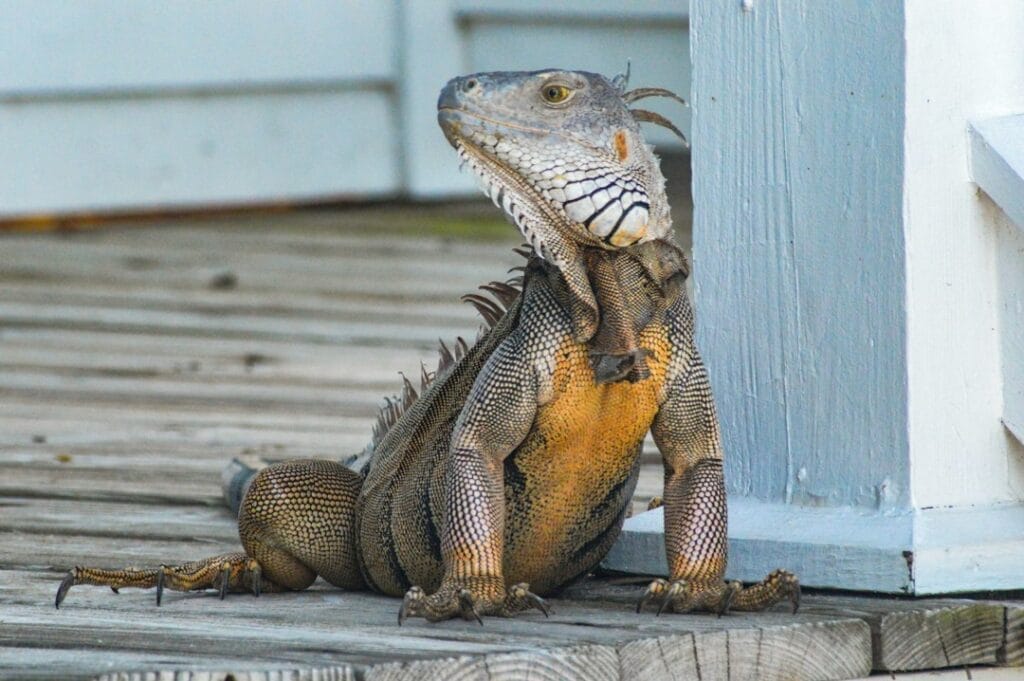Imagine turning a corner of your home into a slice of tropical paradise, complete with a living, breathing piece of prehistoric wonder. Owning a pet iguana entices you with the promise of transforming a nook in your abode into an ancient, verdant haven. But diving into the world of pet iguana care is no small feat.
You’ll learn how to mimic their natural habitat right in your living room, ensuring they thrive under your roof. Guiding you step by step, we’ll show how to craft an ideal habitat and select nourishing meals that ensure their well-being and joy.
But it’s not all sunshine; we also tackle common health issues and lay out what committing to these fascinating creatures means. So, let’s get started on this journey together—by its end, you’ll know if a pet iguana is the right companion for you.
Table Of Contents:
- Pet Iguana Varieties
- Legal Considerations
- Health Issues Common in Pet Iguanas
- Understanding the Basics of Pet Iguana Care
- Creating the Perfect Iguana Habitat at Home
- The Iguana Diet: What to Feed Your Pet
- Pros and Cons of Keeping an Iguana as a Pet
- Iguanas as Pets?
 AI illustration of a pet iguana
AI illustration of a pet iguana
Pet Iguana Varieties
When it comes to pet iguanas, diversity is the spice of life. These fascinating reptiles come in a variety of shapes, sizes, and colors, each with its own unique requirements and characteristics. Understanding the different types can help you make an informed decision on which iguana might be right for your home.
Common Pet Iguanas
The most popular choice among pet owners is the Green Iguana (Iguana iguana). Known for their vibrant green coloration and sociable nature, they can grow up to 6 feet long and live for over a decade with proper care. Another common species is the Lesser Antillean Iguana (Iguana delicatissima), prized for its more manageable size and distinct appearance.
- Green Iguana: Vibrant green color; grows up to 6 feet; social behavior.
- Lesser Antillean Iguana: Smaller size; distinct appearance; requires similar care as Green Iguanas.
Rarer Pet Iguana Varieties
If you’re looking for something truly unique in your pet iguana selection, Rhinoceros Iguana (Cyclura cornuta) and Blue Iguana (Cyclura lewisi) are exotic options that are not endangered and legal to own in most places. However, due to their rarity, they may require a specialized breeder or rescue organization for adoption.
- Rhinoceros Iguana: Distinguished by its horn-like projection on the nose; slightly smaller than Green Iguana.
- Blue Iguana: Noted for its striking blue coloration and rarer status than other varieties.
Legal Considerations
Before bringing an iguana into your home, it’s crucial to understand the legal framework surrounding their ownership. In some areas, iguanas are considered invasive species and therefore restrictions or bans may apply. Always check with local wildlife authorities and acquire any necessary permits to ensure your new pet is both legally obtained and kept. For more information on state-specific regulations, visit the U.S. Fish & Wildlife Service website.
Owning a pet iguana is a rewarding experience that comes with responsibility. Ensuring you understand the needs and preferences of your specific species will go a long way towards creating a harmonious home for both you and your scaly friend.
Health Issues Common in Pet Iguanas
But just like any pet, they have their Achilles’ heel when it comes to health issues.
Nutritional Diseases
A diet lacking in variety can lead your scaly friend down a path of nutritional diseases. Metabolic bone disease, caused by low calcium or an improper calcium-to-phosphorus ratio, tops the list. Think weak bones and lethargy here. Feeding iguanas the right mix of greens, veggies, and supplements is key to dodging this bullet.
Another common issue is obesity from too many treats or fatty foods. Yes, even our reptile buddies can pack on the pounds if we’re not careful about what’s on their plate.
Skin Problems
Skin infections and external parasites also pose threats to iguana health—think mites making themselves at home in your pet’s scales or fungal infections turning into unsightly blemishes. Keeping their habitat clean and monitoring for unwelcome guests helps keep their skin healthy.
If you have questions about the health of your pet iguana, you can sign up for an online vet consultation with Ask A Veterinarian. They are available 24/7 to answer questions.
To avoid unexpected health costs, check out Pet Assure Mint.
Understanding the Basics of Pet Iguana Care
Iguanas, with their prehistoric looks and plant-eating habits, might seem like low-maintenance pets at first glance. But don’t let their laid-back nature fool you; these reptiles have specific needs that must be met to keep them healthy and happy.
Their natural habitat stretches across the rainforests of Central and South America, where humidity is as much a part of life as breathing. Mimicking this environment in your home isn’t just recommended; it’s essential. This means using humidifiers or regular misting systems to keep your iguana’s skin from drying out.
Diet-wise, think green and leafy for these herbivores. While kale might not be everyone’s cup of tea, it’s a feast fit for an iguana king. However, balance is key because too much can lead to health issues. For more detailed dietary advice tailored specifically to iguanas’ unique nutritional needs, Reptiles Magazine offers excellent guidance.
Creating the Perfect Iguana Habitat at Home
Think of your home as a mini-jungle for your iguana, where every detail matters. From the size of their enclosure to the temperature settings, getting it right is key to a happy and healthy pet.
Amazon has a wide variety of iguana habitat products.
Space: The Final Frontier for Your Iguana
Iguanas are not small creatures, especially when they hit their growth spurt. They need room to roam, climb, and bask. An ideal enclosure measures at least 6 feet in height and provides multiple levels for exploration. Squeezing them into a tight spot might stir up anxiety and trigger medical problems.
If you’re handy with tools, consider building a custom habitat that fits these dimensions; guides are available online that show step-by-step how to create an iguana-friendly environment.
The Heat Is On, Temperature & Lighting Needs
Iguanas thrive in warm environments with temperatures ranging from 75°F at night to 95°F during the day. Moreover, exposure to UVB rays is indispensable for these creatures to process calcium and stave off skeletal ailments efficiently. Invest in good quality heaters and bulbs designed specifically for reptiles.
Maintaining these conditions might seem like juggling fireballs, but using digital thermometers can make monitoring temperatures easier than ever before.
The Iguana Diet: What to Feed Your Pet
Feeding your iguana the right foods is like hitting the nutrition jackpot for them. Mastering the art of nourishing your iguana involves striking harmony, diversifying their meals, and grasping the intricacies of their specific nutritional requirements.
Foods to Offer
Iguanas are herbivores with a taste for greens. Think of them as the vegetarians of the reptile world. Their diet should be rich in leafy greens such as collard greens, mustard greens, and dandelion leaves. But it doesn’t stop there; adding other vegetables like squash and zucchini can spice things up for them.
For an extra nutritional punch, sprinkle their meals with calcium supplements twice weekly. This helps prevent bone diseases, which are common in pet iguanas.
Foods to Avoid
Just as important as what you feed your iguana is what you don’t feed them. Stay away from iceberg lettuce since it’s mostly water and lacks nutrients. Also, avoid feeding them animal protein—it can lead to serious health issues over time.
To learn more about creating a balanced diet for your pet iguana, check out this comprehensive guide on Reptiles Magazine’s website.
Pros and Cons of Keeping an Iguana as a Pet
Owning an iguana is like having a little slice of the dinosaur era right in your living room. But before you jump into prehistoric pet parenthood, let’s weigh the good against the not-so-good.
The Upside to Iguanas
Owning an iguana introduces an element of the extraordinary into your living space, elevating it with a dash of wild charm. Get ready to split your greens like kale and carrots with them, as they strictly munch on plants. Plus, with their calm demeanor (when properly socialized), they can become quite affectionate with their owners.
Another plus? Their impressive lifespan means you’re in for a long-term companionship. With proper care, these green buddies can live up to 20 years.
The Downside to Iguanas
However, it’s not all smooth sailing—or should we say slithering? These creatures need space; think custom-built enclosures rather than off-the-shelf tanks. Temperature regulation is critical, too; without precise heat gradients and UVB lighting (source here), health issues could arise.
Last but not least, iguanas require patience and commitment from their owners—especially during those challenging adolescent years when they might redecorate your house with their strong tails.
Iguanas as Pets?
You now know that creating a bit of the tropics in your living space for your pet iguana isn’t just cool—it’s crucial.
Start with understanding their needs. Make sure their habitat feels like home, from temperature to lighting. Remember, what they eat matters as much as where they live.
But let’s not forget: health issues can sneak up on these creatures. Staying vigilant is key.
Owning an iguana means challenges. Caring for an iguana demands dedication.
Keeping a pet iguana healthy and happy with the right knowledge and effort is totally doable—and rewarding, too!

